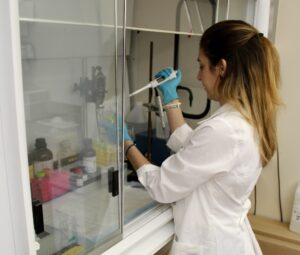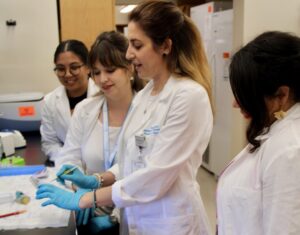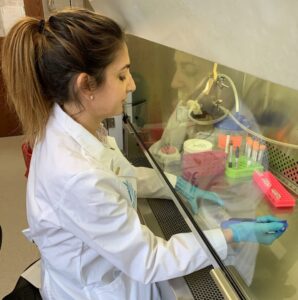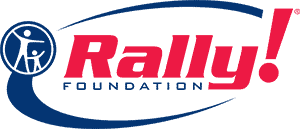Rally Career Development Research Grant Award Update

An Update on the $300,000 Rally Career Development Award to Dr. Rodriguez-Blanco for Medulloblastoma Research
In December 2022, Rally Foundation’s COO Reid Crowe presented a $300,000 Career Development Research Grant to Dr. Jezabel Rodriguez-Blanco, Ph.D. at the Medical University of South Carolina (MUSC). Her research is focused on medulloblastoma, the most common pediatric brain tumor, with the goal of finding new novel therapeutics for this underserved group of patients.

Dr. Rodriguez-Blanco working in her lab.
We sat down with Dr. Rodriguez-Blanco to see how her research was progressing. Excerpts of our interview with this brilliant childhood cancer researcher are below:
What does it mean to your career to win the Rally Career Development Grant with the goal of expediting your research to obtain federal funding?
The career development award I got from Rally was my first grant as an independent investigator. Early on, Rally believed in me and in my research, and in my approaches to improve the outcome for children with medulloblastoma. I am thankful for Rally’s trust at a very early stage of my career, even before proving the feasibility of these research approaches, and I will always be a Rally Scholar – it’s an honor.
Thanks to the support of Rally Foundation, I have been able to establish myself as an independent pediatric oncology investigator and to pursue my main career goal: to find cures for children with medulloblastoma.
Thanks to the support of Rally Foundation, I have been able to establish myself as an independent pediatric oncology investigator and to pursue my main career goal: to find cures for children with medulloblastoma.
Because of Rally’s support and generosity, I have made a significant advance in medulloblastoma research and in my scientific program. I published three research manuscripts and a review article during the first two years of this award.
Experiments supported by Rally have allowed me to engage with the pediatric oncology clinical division at MUSC. Importantly, our team has started conservations with pharmaceutical companies for a future clinical trial as well.
Rally’s support helps us to keep on generating data that will make our proposal more competitive. Data generated by Rally’s grant makes a difference in securing future federal funding.
When and why did you become specifically interested in researching medulloblastoma?
I did my PhD in Neurosciences, but after graduating, I looked for postdoctoral opportunities in cancer research. I knew that cancer was what I really wanted to study.
As a postdoctoral candidate at the University in Miami, I designed a project in medulloblastoma. My very first project was focused on understanding the role of Sonic Hedgehog signaling in medulloblastoma propagation.
Soon after starting my research in pediatric brain tumors, and after becoming a faculty member, I learned about the stories of children with this disease. Helping them became the motivation of my work and the focus of my career.
Research in pediatric cancer does not move as fast as in adult cancer, mostly due to the lack of research, a consequence of the low funding in the field. But I do not want families of pediatric brain tumor patients to feel that no one cares about the cancer their kid is battling. We do care, and every day we are trying to make a difference for their children.
What is medulloblastoma?
Medulloblastoma is the most common pediatric brain tumor in children. It happens in the base of the brain in an area called cerebella. This part of the brain controls posture, balance, and speech. Sometimes, symptoms include a child’s sudden inability to walk straight or talk.
What are the medulloblastoma subgroups?
Medulloblastoma has recently been classified in four major subgroups based mostly on the genetic drivers of these tumors. Sequencing is performed in biopsied tissues to determine which group.
The four subgroups are:
Group 1: Sonic Hedgehog signaling
Group 2: WNT signaling (another key regulator of the embryonic development)
Group 3: Genetic alterations in an oncogene called MYC
Group 4: in which gene alterations are not clearly linked to any intracellular pathway.
There are two particular mutations where the disease is very aggressive and responds poorly to current therapies: Sonic Hedgehog classified tumors that harbor a mutation on P53, and those classified as Group 3 with MYC.

Dr. Rodriguez-Blanco working with her group in the lab.
What group is your research focused on?
For children with medulloblastoma harboring genetic alterations on P53 and on MYC, we work to find better treatments to fight these specific tumors. In addition, we also work in understanding the mechanisms allowing medulloblastoma, mostly the Sonic Hedgehog subgroup, to grow back in the future. We need therapies that prevent these tumors from recurring.
What is your hypothesis?
In our lab we hypothesize that by combining therapeutics and reducing tumor growth we can ensure a long-lasting tumor remission, or even a cure.
If you could change one thing about pediatric research, what would it be?
I would make sure that patient count is not taken into consideration when making federal funding decisions. We all want those kids to go back home, to go back to school as soon as possible. We want to make sure these children receive the treatments they deserve, treatments that are as good as those that adults are able to receive. We need pediatric cancer to be considered as important as adult cancer.

Dr. Rodriguez-Blanco working in her lab at the Medical University of South Carolina.
What would you say to our Rally donors?
Your support helps our research move forward. Thank you for investing in research early. Your donations allow us to improve our research and get federally funded. Your funds allow us to make a difference in the treatment of children with cancer. Without your support, scientific discoveries for pediatric cancers would almost be impossible.
